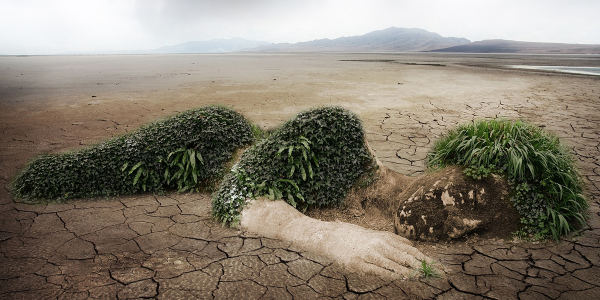Practical Theology Sparking Hope and Moving Hearts to Save the Earth

How can spiritual leaders fight climate change by fostering Earth-centric worldviews in their congregations? A new book edited by Emmanuel College’s academic leaders offers practical tools on incorporating the environment into spiritual practices. (Photo illustration from Pixabay)
By Joe Howell
With billions of humans and countless species threatened by our warming planet, combatting climate change is one of the great challenges of our time. Spiritual leaders have heard the call to action and are working to incorporate the environment into their ministry. How can they foster Earth-centric worldviews in their congregations? How do they help people feel hope and the sacredness of nature?
No change happens without first moving hearts and minds. A newly released book offers practical theological tools to faith leaders in order to help them prioritize environmental messages and practices into their work, such as sermons and spiritual guidance. Practical Theology Amid Environmental Crises, edited by Emmanuel College principal Rev. Dr. HyeRan Kim-Cragg and Rev. Dr. Pamela R. McCarroll, vice-principal of Emmanuel, takes in-depth and peer-reviewed theological examination about our relationship with the environment and how it connects to spiritual life, and translates it into much-needed tools for spiritual leaders of all faiths.
“There’s something so powerful and overwhelming about climate change—the issues we face are quite massive,” said Dr. Kim-Cragg at the book launch in April. “Spiritually, part of the challenge is the creative dance or tension between doing and being.”
“So many of us have been compelled to engage in the topic out of a sense of urgency, given our own experiences of navigating climate crises or incidents, as well as our deep longing for eco-justice and the flourishing of all life,” said Dr. McCarroll. “There’s a lot of fire here—and with it, the opportunity to think together and redirect our research.”
With its emphasis on the concrete realities of people’s lives, practical theology is a useful framework for addressing the interconnected abuses of the earth, and that of marginalized people struggling to survive in ecologically degraded environments. “We hope that this book can help to cultivate an environmental spirituality that connects individuals to the natural world, fostering a sense of responsibility and reverence. A robust environmental ethic grounded in religious traditions can encourage sustainable living and mobilize religious communities to act,” explained Dr. Kim-Cragg.
“One of the powerful themes in the book is how to foster hope in the face of some pretty devastating environmental news. We hear this all the time, about the impact that the environmental threat is having on people’s mental health,” said Dr. McCarroll. The book is an extension of the pedagogical approach at Emmanuel College, which is anchored in rigorous academic and theoretical inquiry and translates the work into real-world, practical applications in serving communities.
Dr. Kim-Cragg agreed: “Emmanuel is cutting-edge in our theological education; it’s not monastic where you just sit in the library reading books. We make space for research that departs from the Western or colonial tradition, tapping into non-Eurocentric and Indigenous methods and ideas,” she said. “You can’t come to terms with ecological issues within a narrow-minded theological discipline.”
You can read Practical Theology Amid Environmental Crises now, available in full at no charge.
Emmanuel College, part of Victoria University in the University of Toronto, is one of the most respected theological schools in North America. By supporting Defy Gravity: The Campaign for Victoria University, you help train the next generation of graduates who will make the world a better place. Learn more about how your gift can make a difference.
Rev. Dr. HyeRan Kim-Cragg is principal of Emmanuel College of Victoria University in the University of Toronto. Committed to an interdisciplinary approach to homiletics in practical theology, her research addresses topics related to biblical interpretation, postcolonial theories, feminist homiletics and liturgy, migration, and decolonizing practices.
Rev. Dr. Pamela R. McCarroll is vice principal of Emmanuel and professor of practical theology. Her present research focuses on ecofeminist, decolonizing approaches to practical theology that serve Earth and intersectional justice. She also publishes in the area of spiritual care and chaplaincy.
